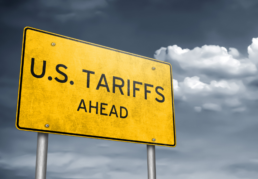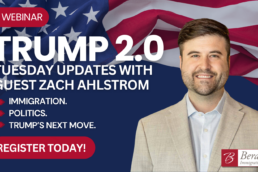The imposition of tariffs has long been a tool of economic policy, often used to protect domestic industries or as a bargaining chip in international trade negotiations. However, the recent push for 25% tariffs by the Trump administration could have unintended consequences, particularly on U.S. immigration patterns. These tariffs, aimed at addressing concerns over illegal immigration and drug trafficking, could lead to job losses, economic downturns, and strained international relations, all of which could significantly impact migration flows.
Economic Impact on Immigrant-Heavy Sectors
One of the most immediate effects of the proposed tariffs would be job losses in industries that heavily rely on immigrant labor, including agriculture, manufacturing, and technology. Higher tariffs could increase production costs, forcing businesses to either relocate operations or cut jobs. With fewer employment opportunities, the U.S. might become a less attractive destination for migrants seeking work, potentially leading to a decrease in legal immigration.
How Tariffs Deter Potential Immigrants
The economic downturn triggered by tariffs could further discourage potential immigrants from seeking opportunities in the U.S. With diminished job prospects, many individuals who might have sought a better life in the U.S. may reconsider their options. Instead, they may opt for alternative destinations with more stable economic conditions or choose to remain in their home countries despite economic hardships.
Strained Relations and Border Dynamics
Tariffs could also exacerbate diplomatic tensions with Mexico and Canada, affecting border security and economic cooperation. In response to Trump’s tariff threats, Mexican President Claudia Sheinbaum and Canadian Prime Minister Justin Trudeau negotiated short-term agreements to postpone the 25% tariffs for one month. These agreements included Mexico deploying 10,000 National Guard troops to the border to combat illegal immigration and fentanyl trafficking. Canada also committed $1.3 billion to border security and ramped up personnel to address organized crime and fentanyl smuggling.
Although these measures might temporarily ease border tensions, prolonged uncertainty over tariffs could make it more difficult for U.S. businesses and policymakers to engage in long-term planning. This could ultimately hurt economic stability, further influencing migration patterns.
Tariffs as a Negotiation Tactic
The Trump administration has historically used tariffs as leverage rather than as a strict economic measure. Much like during his first administration, Trump may be using the threat of tariffs to push Canada and Mexico into stricter border enforcement policies. While this approach has led to short-term commitments, the sustainability of such agreements remains uncertain, especially given the broader economic implications.
Potential Violation of Trade Agreements
Critics argue that these tariffs could violate the United States-Mexico-Canada Agreement (USMCA) by disrupting supply chains and increasing consumer prices. Businesses operating across borders have already expressed concern that the threat of tariffs affects long-term strategies and investment decisions. Additionally, the global trade landscape is further complicated by China’s retaliatory tariffs of 10-15% on some U.S. goods, following the U.S.’s own 10% tariffs on Chinese imports.
Conclusion
While the intended goal of the proposed tariffs is to curb illegal immigration and drug trafficking, the economic repercussions could ultimately have the opposite effect. Job losses in key industries, economic instability, and strained international relations could discourage both legal and illegal immigration in unexpected ways. If tariffs continue to be used as a negotiation tactic rather than a consistent economic policy, uncertainty will remain a defining factor in both trade and immigration dynamics. The question moving forward is whether the economic and diplomatic costs of these tariffs outweigh their intended benefits.
At Berardi Immigration Law, we understand how global and domestic policies can influence your immigration journey. Our team of experts is here to provide guidance and help you navigate these evolving challenges. Please don’t hesitate to contact us for support.
Ready to have Berardi on your side?
Whether you’re a business looking to hire or a professional hoping to relocate, immigration law can be complicated. But you don’t have to do it alone. Put our experience to work for you.



